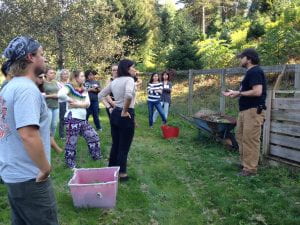Home | Unit 1 | Unit 2 | Unit 3 | Unit 4
Learning Activities
- Action Takers: What are People Doing?
- What are We Doing? Peer Interviews, Interview Skills
- Interviewing Practice and Role Play
- Showcasing Community Heroes and Action Takers
- NYS 4-H Virtual Meeting Guidance
Unit Three Facilitator Guide: a downloadable pdf of Unit Three, complete with activities, handouts and tools for facilitators.
Introduction
In Unit Two: What I Know? your group participated in activities that explored self-awareness, self-control, existing knowledge, and how they see themselves as part of a larger more complex system. You explored a variety of pro-active sustainable practices that offer solutions to climate change issues. Before starting this unit, your group may have taken a more in-depth study of climate, weather, and the science and effects of climate change and global warming or used the additional resources to compliment the activities in Unit Two.
In Unit Three, “Community Action” your group will work through a series of experiential activities leading up to the final preparation and presentation of a video project. Participants will explore videos illustrating actions that people are taking to both address climate change issues and reduce their carbon footprint. These videos will serve to increase resiliency awareness and act as a tool to inspire youth to reflect on their own practices. They will also be used as technical examples for participants to observe style and content which participants can model and use to create their own videos. Groups will learn/enhance interviewing skills through practice, review, observations and utilization.
up to the final preparation and presentation of a video project. Participants will explore videos illustrating actions that people are taking to both address climate change issues and reduce their carbon footprint. These videos will serve to increase resiliency awareness and act as a tool to inspire youth to reflect on their own practices. They will also be used as technical examples for participants to observe style and content which participants can model and use to create their own videos. Groups will learn/enhance interviewing skills through practice, review, observations and utilization.
Note: the final activity, the video production itself can be used by beginner skill levels, with adult supervision of the project if needed.
Target Objectives
- Recognize minor and major actions that address climate change issues.
- Reflect on personal actions taken on a daily basis that demonstrate sustainability.
- Locate examples of people in communities taking action and exhibiting sustainable methods and strategies.
- Practice and build upon interview skills.
- Construct an interview questionnaire to collect information via investigative methods from people making positive change in their communities.
- Perform and report personal stories through video interviews.
- Collaborate with peers and utilize various modes of technology to produce informational videos.
Thriving Model Attributes
- Youth Engagement: openness to challenge and discovery, positive emotionality, goal management
- Developmental Outcomes: connection to others, personal responsibility
- Long-Term Outcomes: happiness and wellbeing
Authors: Donna Alese Cooke, Cornell Garden-Based Learning Vegetable Varieties Investigation, Reviewers: Marcia Eames-Sheavly, Joy Flynn, CCE Suffolk Master Gardener Volunteer


